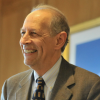How Science and Engineering Practices Enhance STEM Teaching and Further Teacher Leadership

The science and engineering practices of the Framework for K-12 Science Education (and the derivative Next Generation of Science Standards NGSS) form one crucial element in high quality science instruction. All science teachers have seen the titles of the eight practices. Some science teachers have read about these practices or attended a full day workshop where the eight practices were discussed. We have embarked on trying to capture the intent and deep understanding of a single practice over the course of full semester.
That semester with a focus on ONE science and engineering practice is part of a two-year program that helps teachers to become teacher leaders in their schools and districts.
Each of the panelists has worked with a team of grade level colleagues over the course of a full semester. Each of the panelist’s teams have chosen a course of study that included one science and engineering practice and one research article. They each recorded a lesson that reflected their sense of the science and engineering practice and the application of the research article’s theme. On a rotating basis, over the semester, the team then observed recordings of each other’s classes, provided each other with feedback on those lessons and reviewed student artifacts. Through these interactions, they have deepened their understanding and interpretation of what their chosen science and engineering practice looks like in the classroom. At the end of the semester, they share their findings regarding the practice with teachers from their districts and nationally.
Panelists this month represent four locales (CA, TX, FL, MO), four grade levels and rural, suburban and urban school districts. Each one was part of a team that focused on a different science and engineering practice. By listening to their stories, the value of a deep dive of a practice will become evident.
In a larger context, the semester’s work that will be discussed is part of a larger two-year program to develop teacher leaders. The Wipro Science Education Fellowship program (Wipro SEF) is now active at seven universities and 35 school districts. Over 400 teacher leaders have completed the program and become district resources ready and able to support district initiatives. Unlike some teacher leader professional development programs whose focus is on creating individual teacher leaders, Wipro SEF’s focus is on district transformation where a cohort of teacher leaders in the district become the critical mass required for district wide change.
The Wipro SEF districts and district science coordinators now have the experiences, insights, and enthusiasm of a dozen teacher leaders. When a new science initiative is being considered for a school or for the district, the science coordinator can call on the Wipro Fellows for their take on the plan. How will it work at the middle school level? Will the elementary teachers need some professional development? How will high school instruction have to change if the middle school curriculum changes in this way?
The Wipro SEF leaders learn about leadership as they work on their course of study with a science and engineering practice, as well as other components of the program. They work across grades, across districts and nationally. They read research articles and make presentations to their peers in the program and at conferences. It’s an enormous effort on their part. It allows them to become teacher leaders while remaining in the classroom. By virtue of this work, they define what teacher leaders think is worthwhile to improve science education in their classes, schools, and districts.
We invite you to consider how this model (or elements of this model) of teacher leadership may be replicated at your school or university.